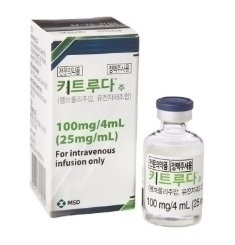MSD’s cancer immunotherapy Keytruda (ingredient: pembrolizumab) beat Bristol-Meyers’ similar drug Opdivo (nivolumab) in the global immunotherapy sales last year, on the back of the brisk performance in the lung cancer treatment.

Whether Keytruda’s winning streak will continue will be decided in April when the U.S. Food and Drug Administration is to announce its review results for the expansion of Keytruda’s indication, however.
The FDA initially planned to decide by January this year whether to allow Keytruda to be used as the first-line monotherapy for patients with non-small cell lung cancer (NSCLC), whose programmed cell death ligand 1 (PD-L1) expression Tumor Proportion Score (TPS) was 1 percent or more. However, the regulator extended the review period by three months to April.
According to MSD’s public disclosure on global sales on Friday, Keytruda sold $7.17 billion in 2018, surging 88.3 percent from $3.8 billion in 2017.
Keytruda’s sales account for about 19 percent of the total 2018 revenue ($37.68 billion) of MSD’s pharmaceutical division, winning the diabetes treatment Januvia to become the No. 1 sales item among MSD products.
In contrast, BMS’ Opdivo which used to lead the immunotherapy market until the first quarter last year sold only $6.73 billion globally in 2018. The figure is a 36.1 percent increase from $4.94 billion in 2017.
Keytruda’s sales had been lagging behind that of Opdivo by more than $1.1 billion in 2017. However, it sold more than Opdivo by $436 million last year.
Industry watchers attribute the quick catchup of Keytruda to the drug’s better performance in lung cancer.
Both MSD and BMS have sought to expand the indication of Keytruda and Opdivo to treat lung cancer area where the two treatments are sold the most. However, only MSD has been successful in indication expansion. Keytruda is the only treatment that obtained approval for the first-line treatment of locally advanced or metastatic NSCLC.
BMS had applied for U.S. approval for a combination of Opdivo and Yervoy as the first-line therapy for patients with Tumor Mutational Burden 10 or over, but the company withdrew the application voluntarily.
On the contrary, MSD obtained the nod for Keytruda to be used as a monotherapy for patients with NSCLC whose PD-L1 expression TPS was 50 percent or more. The drugmaker is now seeking the FDA’s green light for Keytruda as the first-line treatment for patients whose PD-L1 expression TPS is 1 percent or more.
MSD had expected to have the FDA’s review results by January this year. However, the FDA in December decided to extend the review process.
The company submitted additional data and analysis to the FDA and is waiting for the results to be announced on April 11 under the Prescription Drug User Fee Act.
According to the KEYNOTE-042 clinical trial results, Keytruda monotherapy extended the median of overall survival (OS) to 16.7 months for locally advanced or metastatic NSCLC patients whose PD-L1 expression TPS was 1 percent or more, compared to the standard chemotherapy with the median OS of 12.1 months.
The study showed that the effectiveness of Keytruda was different depending on the groupings of PD-L1 expression.
The median OS of patients whose PD-L1 expression TPS was between 1 percent and 49 percent was 13.4 months, compared to the standard chemotherapy with 12.1 months.
In the group of patients with PD-L1 expression TPS at 50 percent or more, the median OS was 20 months in Keytruda treatment, and 12.2 months in the standard chemotherapy.
The study showed that treatment benefits of Keytruda widely fluctuated depending on the patients’ PD-L1 expression.
Pharmaceutical market research firm Evaluate said in a recent report that industry watchers should pay attention to the regulators’ stance over the expansion of expensive immunotherapies.
In the early stage of immunotherapy development, the regulators were lenient in allowing drugmakers to expand indications. However, they recently started to demand additional data to confirm more accurate and credible therapeutic effects, the report said.
The report added that it remains to be seen whether pharmaceuticals would continue to win approval for an expanded indication in 2019, just as they did so last year.

